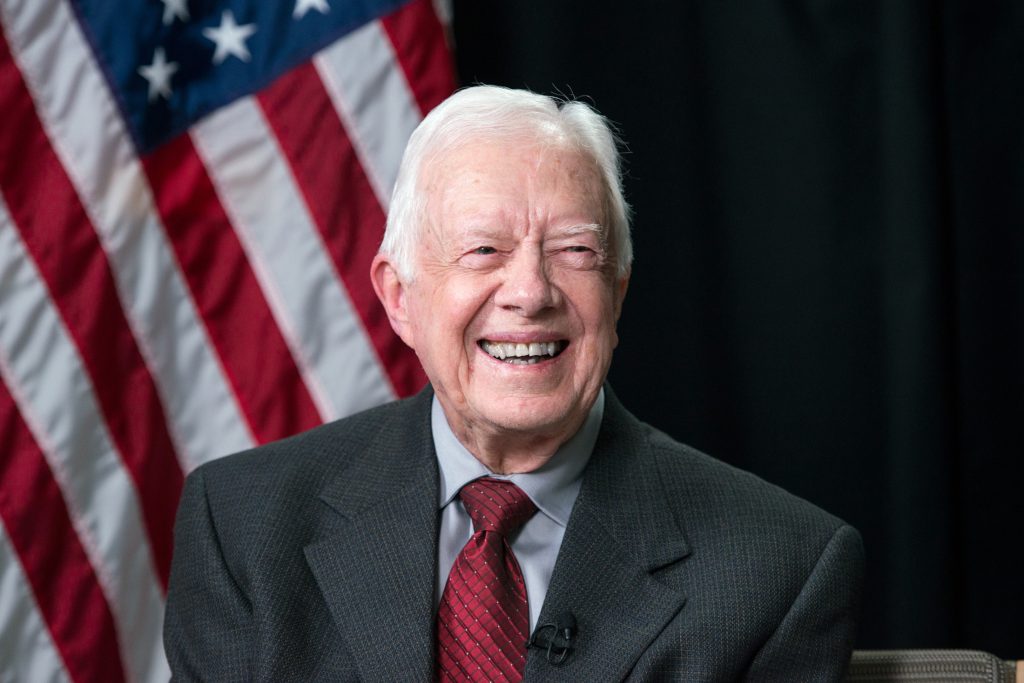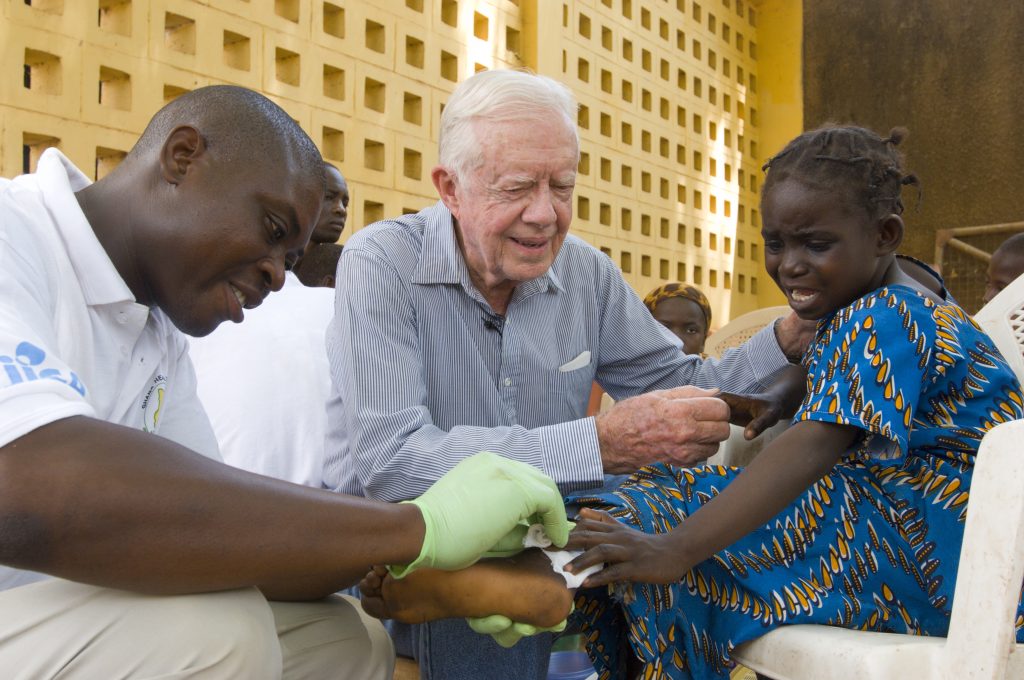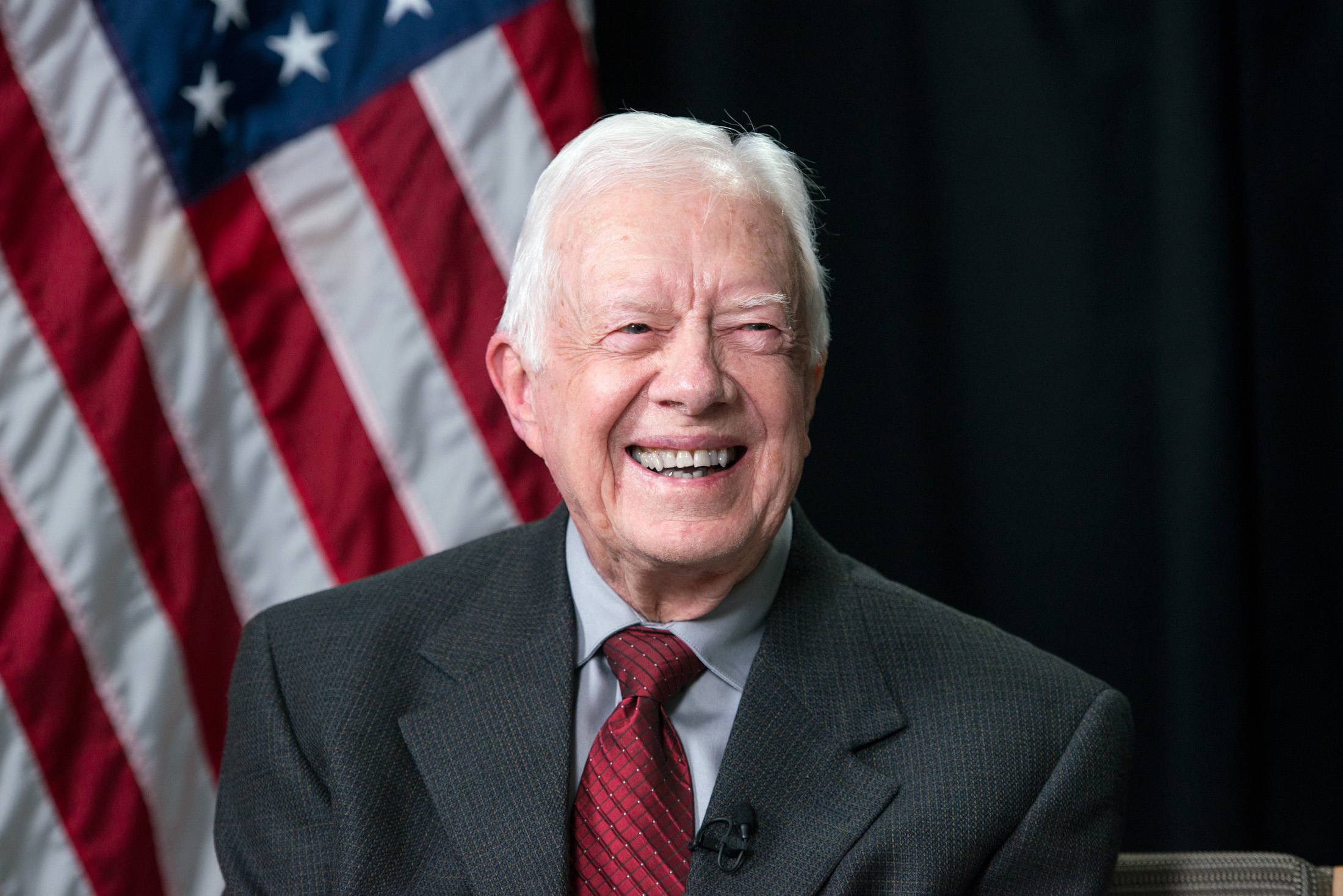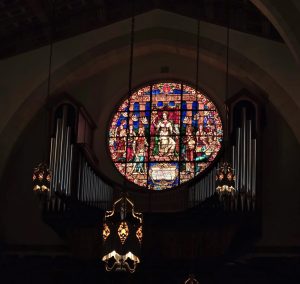
“Wherever life takes us, there are always moments of wonder.” –Jimmy Carter
Jimmy Carter was the first president to be born in a hospital, the only president to live in public housing, and is the oldest living, longest-lived commander-in-chief.
The peanut farmer and birdwatcher from Plains, Georgia who became the 39th President of the United States, will celebrate his 100th birthday on October 1.
James Earl Carter Jr. is oft praised as the Mister Rogers of Presidents.
It’s not just because of his fashion choices—although he once sported an unbuttoned wool cardigan in a 1977 national broadcast dubbed “The Sweater Speech,” urging all Americans to turn their thermostats down to 65 degrees amidst an energy crisis. It’s his broad smile, gentle tone, love for music, and even keel that elicits the comparison. He ran the country like he ran his farm: with honesty and compassion.
After his 1977 presidential inauguration, Carter ditched his bullet-proof limousine on Pennsylvania Avenue to walk the mile and a half stretch back to the White House. As President, he was this “walking” contradiction: an anti-political, Progressive Evangelical Christian with a charming Southern drawl, who eschewed pretentious airs, led with morals, and invested his deep-rooted faith into science and technology to advance human rights on a global scale.
He was also a nuclear engineer and lieutenant in the U.S. Navy but resigned to take over the family peanut farm when his father Earl died of pancreatic cancer.
Few presidents have made such great environmental strides in a single term: Carter put 56 million acres of Alaskan land under federal protection with the 1906 Antiquities Act, installed solar panels on the White House, and designated a national “Sun Day”: it’s May 3, in case you were curious.
But this comes as no surprise—even as a young boy in Southern Georgia, Carter loved nature and animals. He had a pet alligator he named Mickey Mouse, and he reintroduced wild turkeys to Georgia when he was Governor.
Along with the sweet warble of the Painted Bunting and the other 1,200 Georgia birds Carter has spotted, the former president also appreciates a good song.
Music Lover
“One of the things that has held America together has been the music that we share and love.” – Jimmy Carter
Let it be known that Jimmy Carter loves music.
An early birthday party on September 18th at the Fox Theatre in Midtown Atlanta, titled “Jimmy Carter 100: A Celebration in Song,” showcased a lifetime of his diverse musical tastes: The band GROUPLOVE performed their chart-topping song “Tongue-tied,” and Chuck Leavell covered the Allman Brothers Band—the group, best known for “Ramblin’ Man,” is what Carter claims got him into the White House. Campaign funds were dismally low in 1975, and the band’s performance at a Providence fundraiser saved the “Peanut Farmer’s” bid and cemented him as a countercultural icon.
Carter quoted his best friend of 40 years, Bob Dylan, in a presidential acceptance speech at the Democratic National Convention:
“I’ve never had more faith in America than I do today,” he said. “We have an America that in Bob Dylan’s phrase is ‘busy being born, not busy dying.’”
Dylan said Carter was a “kindred spirit” to him. It was Chip, the second Carter son, who orchestrated Dylan’s first visit to their Georgia home. He was a super-fan of sorts who had traveled to Woodstock just to shake Dylan’s hand.
In his music documentary, Jimmy Carter recounted: “When I was governor, my sons were living in the Governor’s mansion with me. Bob Dylan’s music permeated through the Governor’s mansion. My sons and I were brought closer through Bob Dylan’s songs. Chip knew every lyric of every Bob Dylan song that had ever been written.”
Carter was a bit of a super-fan himself: the first thing he did when he met Dylan was quote his songs back to him. The two had discussed religion at length, and Dylan, a Nobel laureate himself, briefly converted to Christianity and later returned to Judaism.
When it came time for Bob Dylan to receive the MusiCares Person of the Year honor at the 2015 Grammy Awards, the former president appeared on stage and moved his longtime friend with a heartfelt message:
“Bob Dylan knew how to put the essence of all the great religions into beautiful lyrics, which have been an inspiration to me and to the whole world,” said Carter. “There is no doubt that his words on peace and human rights are much more incisive, and much more powerful, and much more permanent than any president of the United States.”
Other close friends, Willie Nelson and Jimmy Buffet, could be heard shredding away at his rallies. The man embraced rock and roll before any other president had, and it secured him the faith of America’s younger voters. When he finally won the 1976 presidential election, Aretha Franklin, the world-wide “Queen of Soul,” sang a special rendition of “God Bless America” in his honor.
Carter’s diverse music taste—folk rock, gospel, pop, soul, jazz, classical, country, you name it—and promotion of underrepresented musicians was on brilliant display in the birthday celebration at the Fox Theatre. The event mirrors a career dedicated to bringing people together over the universal language and to improving the civil and political rights of Black Americans.
Racial Justice
As state senator, Carter repealed laws that created obstacles for Black voters in Georgia. Growing up in the segregated town of Plains, most of his closest childhood friends were Black. Alonzo Davis, the nephew of Black tenant farmers on the Carter farm, was best friends with Jimmy. The two grew up together during a time when Jim Crow laws were violently imposed, which molded Carter’s passion for defending human rights. His home state wasn’t fully desegregated until the 1970s.
Wesley A. Brown, the first Black man to graduate from the Naval Academy in 1949—the first five Black students admitted they were tormented into leaving—recalled in a 1995 Baltimore Sun interview that Jimmy Carter, his cross-country teammate, had encouraged him to persevere through the academy when he faced harassment from classmates.
Carter lost his first bid for governor due to his pro-integration stance. After becoming governor, he shifted to full-out condemnation of racism. By the time his presidential term ended, Jimmy Carter had appointed more people of color and women to the federal judiciary than all other presidents combined.
Human Rights Advocate

“The bond of our common humanity is stronger than the divisiveness of our fears and prejudices.” – Jimmy Carter Nobel Lecture, 2002
Some turn to golf or retirement after losing an election. Not Jimmy.
When he fell short to Ronald Reagan in 1980, the humanitarian founded The Carter Center in 1982 as a distinguished professor at Emory University in Atlanta, Georgia. The non-profit NGO, shepherded by Carter and the former First Lady, is dedicated to waging peace, defending democracy, and has a fierce task force for disease eradication that has saved millions of lives from ailments like the Guinea worm disease.
In 2002, Carter was awarded the Nobel Peace Prize “for his decades of untiring effort to find peaceful solutions to international conflicts, to advance democracy and human rights, and to promote economic and social development.”
The romance and enduring marriage of Jimmy and Rosalynn transfixed the public before and after her passing in 2023—just look at this 1977 clip of their first dance at the Inaugural Ball—but their joint humanitarian work takes the cake. The two met when Rosalynn was a newborn: back in 1927, Jimmy’s mother, Lillian Carter, a nurse at the local hospital, happened to deliver baby Rosalynn.
Habitat for Humanity was founded near Plains, and Carter has held his commitment to the group since the 1980s. When he was 95, he got a black-eye from a fall that required him to get 14 stitches a day prior to a Habitat event. He still showed up in Nashville to help build homes, hammer in hand.
Jimmy Carter is the epitome of “doing your best,” something he picked up from an intense interview with Admiral Rickover at the Naval Academy. Carter is the only U.S. President to have attended the Naval Academy in Annapolis, graduating in 1946 with distinction. There is a famous story from his meeting with Rickover that stoic philosophers and leadership coaches alike love to share:
Rickover probed him with the question, “Did you always do your best?”
Carter considered this carefully, replying, “No, sir, I didn’t always do my best.”
“Why not?” said the Admiral.
This question guided a life dedicated to service. The Jimmy and Rosalynn Carter Work Project for Habitat for Humanity has built 4,300 homes across 14 countries with over 100,000 volunteers.
The Presidency
Professor of Political Science at Rollins College, Dan Chong, shares, “The 1980 election was interesting because it was really the start of the religious right as a major political force, choosing Reagan because of his politics, especially abortion and trickle-down economics, rather than Carter, the devout Christian.”
The highlight of President Carter’s tenure was the peace agreement he mediated between Israel and Egypt in 1978. This resulted in the Camp David Accords, which recognized the “legitimate rights” of Palestinian people and opened an avenue for the 1993 Oslo Accords between Israel and Palestine.
Conflict in Iran, the fall of the Shah, and the Soviet Union’s invasion of Afghanistan represented significant setbacks in foreign policy that made the president fall out of public favor and led to Reagan’s election.
“Carter’s work post-presidency has really been influential not only in supporting democratic elections around the world but in providing humanitarian aid where urgently needed,” shares Dr. Chong.
Approaching his 100th year around the sun, President Carter is still tuned into American politics. Jason Carter, his eldest grandson, told USA TODAY that Jimmy has become more active and excited about the election in recent months. According to his grandson, he watches the news and is following the situation in Gaza, an issue he has cared deeply about in his career of humanitarian work. As for what he thinks about his upcoming October milestone, Carter’s son, Chip, shared with FOX 5 Atlanta: “He said he didn’t care about that. It’s just a birthday. He said he cared about voting for Kamala Harris.”
Legacy
Let’s cut the cake, here: What does the 100-year celebration of Carter’s birth mean for all of us?
It is my hope that people recognize there is more to Jimmy Carter’s legacy than his tremendous accolades or even those human rights initiatives that improved millions of lives. His acts were entirely selfless: for the love of his wife, for the love of his country, and for the love of humankind. His unmitigated respect for all people, irrespective of class, gender, color, or creed, has carried him to the centenary of his birth date: October 1, 1924. Carter was deeply religious but felt there were mistakes in the Bible and mistakes in how some people took messages of division from it. He was President but wasn’t above physical labor or living in the same home for 60 years. In fact, he made it very clear that material wealth had nothing to do with success or happiness but was determined by “adhering to God’s standards of truth, justice, humility, service, compassion, forgiveness, and love.” He said, “the only failure is not trying.”
And so, I believe Carter would agree that when you picture sitting in front of your life’s work think not of your failures but, in the words of Admiral Rickovers, instead ask: “Did you do your best?”
Take it from the centenarian himself: “Failure is a reality; we all fail at times, and it’s painful when we do. But it’s better to fail while striving for something wonderful, challenging, adventurous, and uncertain than to say, ‘I don’t want to try because I may not succeed completely.’”
The opinions on this page do not necessarily reflect those of The Sandspur or Rollins College. Have any additional tips or opinions? Send us your response. We want to hear your voice.







Comments are closed.